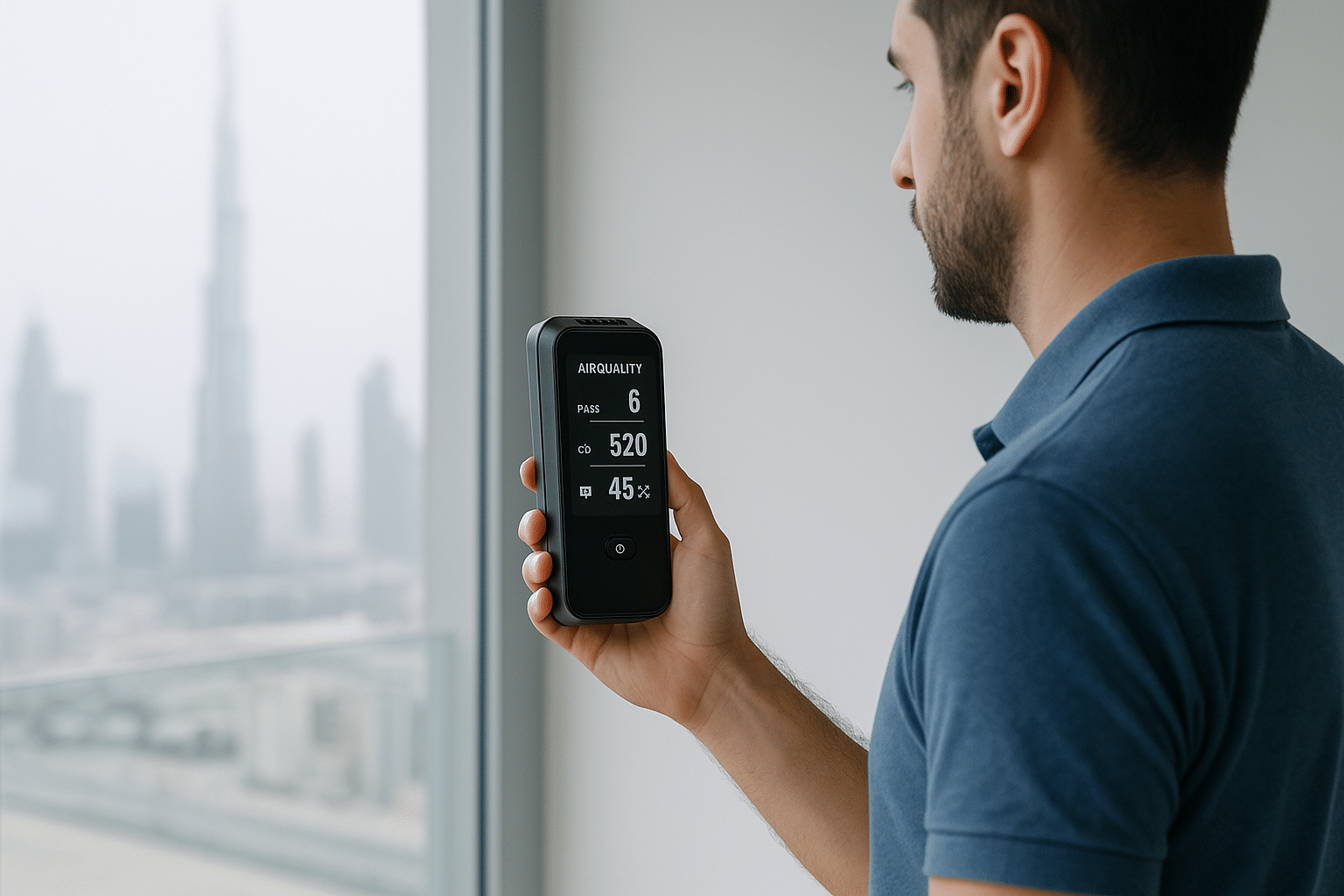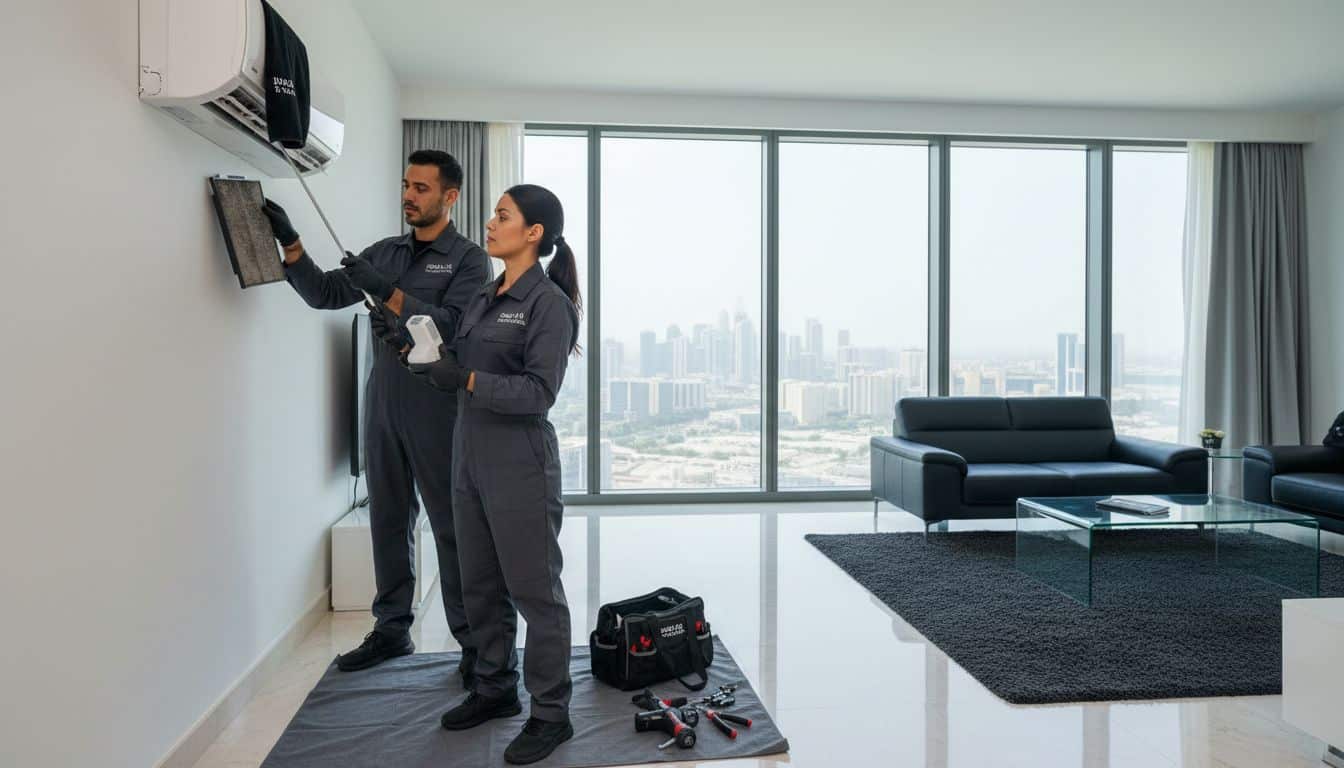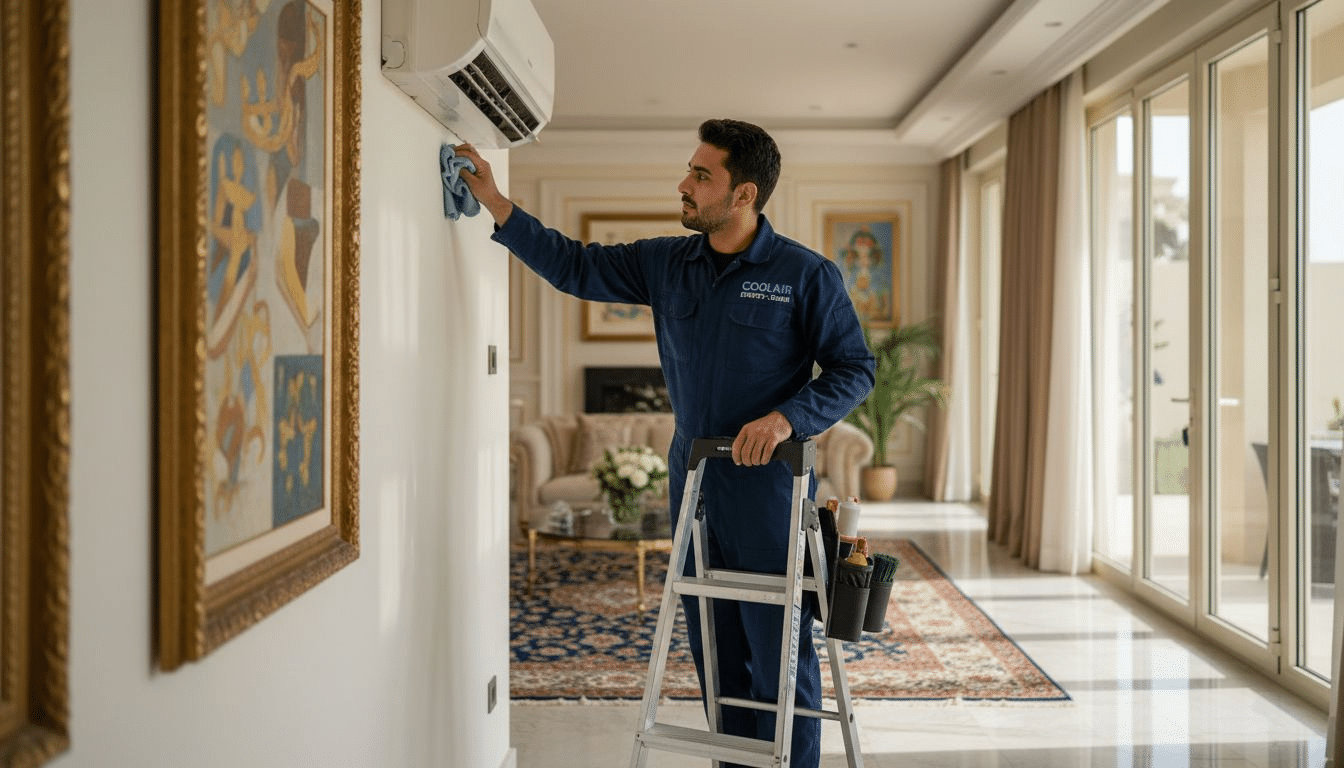
10 Key Benefits of Indoor Air Quality Testing Dubai for Health and Comfort
Table of Contents
Contents
- 1 Table of Contents
- 2 What is Indoor Air Quality Testing Dubai?
- 3 Why Indoor Air Quality Testing is Critical in Dubai
- 4 Common Pollutants Detected in Dubai Indoor Air
- 5 How Indoor Air Quality Testing Protects Health
- 6 Key Benefits of Duct Cleaning Linked to Air Quality
- 7 FAQ About Indoor Air Quality Testing Dubai?
- 8 Choosing the Right Indoor Air Quality Testing Service in Dubai
- 9 Local Regulations and Standards on Indoor Air Quality in Dubai
- 10 How Saniservice Services Support Dubai Indoor Air Quality Testing
- 11 Conclusion: Ensuring Healthy Indoor Air in Dubai
- 12 Comprehensive Insights into Indoor Air Quality Testing Dubai
What is Indoor Air Quality Testing Dubai?
Indoor air quality testing Dubai involves the systematic measurement and analysis of pollutants, allergens, and contaminants in enclosed environments within the city. This process helps determine the purity and safety of the air we breathe inside homes, offices, and public spaces. Using advanced instruments and methods tailored for Dubai’s unique climate and building structures, professionals measure factors like particulate matter, volatile organic compounds (VOCs), carbon dioxide, humidity, and microbial presence.
This testing is essential due to the hot arid climate, frequent dust storms, and high urban density affecting the indoor environment. It provides insight into unseen health risks and helps devise strategies for cleaner air. This testing is not only for residential but also for commercial properties, schools, healthcare facilities, and industrial areas in Dubai, ensuring compliance with Dubai Municipality guidelines.
Why Indoor Air Quality Testing is Critical in Dubai
The importance of indoor air quality testing Dubai has grown in recent years due to multiple factors unique to the city. Dubai’s rapid urbanization, increasing use of air conditioning, and frequent construction activities contribute to increased accumulation of indoor pollutants. Poor air quality indoors can lead to respiratory issues, allergies, and decreased productivity.
Moreover, Dubai’s climatic conditions often mean that people spend up to 90% of their time indoors, whether at homes, offices, or malls. This increases exposure to indoor air contaminants if air quality is not regularly assessed. Testing ensures that buildings provide a healthy environment, reducing risks from dust, mold, formaldehyde, and other pollutants common in Dubai’s built environments.
Common Pollutants Detected in Dubai Indoor Air
Indoor air quality testing Dubai often reveals a variety of contaminants that impair health and comfort. Some notable indoor pollutants prevalent in Dubai buildings include:
- Particulate Matter: Fine dust from desert sand and construction sites that penetrates indoor spaces, aggravating respiratory diseases.
- Volatile Organic Compounds (VOCs): Emitted from paints, furnishings, carpets, and cleaning agents common in Dubai offices and residences.
- Mold Spores: Resulting from humidity or water leaks, especially in areas like Dubai Marina and Downtown Dubai during rare rains or AC failures.
- Carbon Dioxide (CO2): Elevated levels in crowded indoor spaces can cause headaches and fatigue.
- Biological Contaminants: Bacteria, viruses, and allergens that accumulate in poorly maintained HVAC systems and ducts.
Knowing these pollutants through testing helps determine the best steps to improve indoor air quality effectively.
How Indoor Air Quality Testing Protects Health
Performing this service plays a vital role in protecting the health of occupants. By identifying harmful substances early, residents and businesses can implement targeted solutions to reduce exposure.
Exposure to poor indoor air quality is linked to respiratory conditions like asthma and bronchitis, allergic reactions, headaches, and even long-term cardiovascular problems. Testing helps validate whether ventilation systems are performing adequately, whether air filters need replacement, or if duct cleaning is necessary to minimize microbial buildup.
Many hospitals and schools in Dubai harness this service to maintain safe environments, fulfilling regulations set by Dubai Health Authority (DHA) and Dubai Municipality. Early detection through testing also supports individuals with sensitivities by helping reduce triggers inside their living or working spaces.
Key Benefits of Duct Cleaning Linked to Air Quality
One of the foundational services linked to indoor air quality testing Dubai is duct cleaning. Understanding the direct benefits of duct cleaning clarifies why it is a recommended component of maintaining indoor air quality.
- Eliminates Dust and Debris: Duct cleaning removes accumulated dust, pet dander, and dirt, which otherwise circulate and degrade air quality.
- Reduces Allergens and Irritants: Cleaning ducts lowers allergens that trigger asthma and allergic reactions, critical in Dubai’s dusty environment.
- Improves HVAC Efficiency: Clean ducts enhance airflow, reducing strain on air conditioning systems common in Dubai’s hot climate.
- Minimizes Mold Growth: Moisture and dirt in ducts can foster mold; cleaning eliminates this risk, ensuring healthier air.
- Extends Equipment Lifespan: Regular duct cleaning reduces wear on HVAC units, helping Dubai residents avoid premature costly repairs.
Those interested in learning more about professional duct cleaning standards can visit the National Air Duct Cleaners Association (NADCA) website for insights relevant to indoor air quality in Dubai for best practices and certifications.
FAQ About Indoor Air Quality Testing Dubai?
What is the typical indoor air quality testing process in Dubai?
The process typically involves onsite measurements with portable devices for particulate matter, VOCs, humidity, and CO2. Samples may also be collected for lab analysis of microbial content. Testing specialists assess HVAC systems and ducts to determine contamination sources.
How often should indoor air quality testing be done in Dubai homes?
Testing is recommended at least annually or when occupants experience unexplained health symptoms, odors, or visible mold. After renovations or duct cleaning, retesting confirms improvements.
Is indoor air testing available for Dubai commercial properties?
Yes, many companies perform testing tailored for offices, schools, healthcare, and hospitality venues in Dubai to comply with Dubai Municipality standards.
Can duct cleaning alone improve indoor air quality?
While duct cleaning significantly improves air quality by removing contaminants, it works best combined with regular testing and proper HVAC maintenance for lasting results.
Choosing the Right Indoor Air Quality Testing Service in Dubai
Selecting a reliable service provider is fundamental for accurate indoor air quality testing Dubai. Here are some tips:
- Certifications and Experience: Choose companies certified by relevant UAE or Emirates authorities and with proven track records in Dubai.
- Comprehensive Testing: Services should cover a wide range of pollutants relevant to Dubai’s environment.
- Transparent Reporting: Detailed reports explaining findings with clear recommendations.
- Post-Test Services: Consultation and solutions like duct cleaning, air purifier installation, or HVAC inspections.
- Localized Expertise: Dubai knowledge is crucial due to specific climatic and regulatory requirements.
One accessible company for comprehensive indoor air quality testing Dubai and maintenance is Saniservice, which offers specialized services focused on Dubai properties.
Local Regulations and Standards on Indoor Air Quality in Dubai
All such testing must align with these frameworks. For instance, buildings in Dubai Marina and Business Bay are subject to maintaining air quality thresholds to protect occupants from increasing urban pollution. Compliance also aims to reduce environmental health issues like Sick Building Syndrome (SBS).
Businesses failing to meet standards may face inspections and are encouraged to take corrective actions promptly, usually involving thorough air quality assessments and duct cleaning services.
How Saniservice Services Support Dubai Indoor Air Quality Testing
Saniservice excels in delivering tailored indoor air quality services, focusing strictly on Dubai-based clients. Their team uses modern testing equipment and integrates findings with practical cleaning and maintenance solutions.
- Comprehensive indoor air testing including particulate, VOCs, microbial counts, and humidity levels.
- Professional duct cleaning to remove accumulated dust, allergens, and mold spores.
- Consultation services advising on HVAC improvements and ongoing air quality management.
- Support in meeting Dubai Municipality regulatory requirements and documentation.
Choosing Saniservice enables Dubai residents and businesses to ensure their indoor air remains fresh, healthy, and compliant with local standards.
Conclusion: Ensuring Healthy Indoor Air in Dubai
Ensuring healthy indoor air is a vital practice that can dramatically improve health, comfort, and productivity for residents and businesses alike. It reveals hidden pollutants common in Dubai’s unique climate and built environment, fostering proactive steps toward cleaner air.
Duct cleaning, highlighted as a crucial service linked to testing, helps maintain HVAC efficiency and reduces allergens significantly. Aligning with Dubai Municipality regulations ensures safer indoor environments in popular areas like Downtown Dubai, Dubai Marina, and Arabian Ranches.
By prioritizing healthy indoor air, supported by trusted providers like Saniservice, individuals and businesses can safeguard their wellbeing and create healthier indoor spaces. If you are concerned about your indoor air, contact a certified testing service to assess and improve your environment today.
Comprehensive Insights into Indoor Air Quality Testing Dubai
Indoor air quality (IAQ) is a growing concern in Dubai as urban development and climatic factors contribute to changing indoor environments. With rising awareness about health and wellness, especially in offices, residential towers, schools, and medical facilities across Dubai—areas such as Business Bay, Dubai Marina, and Nad Al Sheba are witnessing increased demand for precise assessment of indoor air conditions. Understanding the importance of indoor air quality assessments helps residents and business owners proactively safeguard occupant health and comply with Dubai Municipality and Dubai Health Authority (DHA) regulations.
Why Indoor Air Quality Assessment is Essential in Dubai
The unique climate and urbanization of Dubai introduce specific challenges to maintaining clean indoor air. The extreme heat encourages continuous use of air conditioning systems, which, if not properly maintained, can circulate pollutants such as dust, mold spores, and volatile organic compounds (VOCs). Additionally, Dubai’s rapid construction pace means occupants may be exposed to chemical emissions from paints, adhesives, and building materials long after project completion.
Beyond comfort, poor IAQ can contribute to a range of health problems including respiratory issues, allergies, headaches, and even long-term chronic conditions. The Dubai Municipality’s health and safety standards emphasize mitigation of indoor air contaminants to protect public health. Furthermore, the DHA requires healthcare and education facilities to monitor and maintain indoor environmental quality to meet operational licensing conditions.
Key Indoor Pollutants Monitored in Dubai Environments
When conducting indoor air quality assessments in Dubai, certified professionals evaluate various airborne contaminants relevant to the local context, including:
- Particulate Matter (PM2.5 and PM10): Fine particles from traffic, construction dust, or indoor sources like smoking and cooking can enter air conditioning systems.
- Volatile Organic Compounds (VOCs): Emitted by paints, cleaning agents, furniture, and carpets, VOCs affect indoor air significantly, especially in newly furnished or renovated spaces in Dubai Marina or Downtown Dubai apartments.
- Carbon Dioxide (CO2): High concentrations indicate inadequate ventilation, common in densely occupied offices or schools.
- Carbon Monoxide (CO): Although less common indoors in Dubai, faulty combustion appliances can generate dangerous CO concentrations.
- Biological Contaminants: Mold, mildew, bacteria, and allergens thrive in improperly maintained HVAC systems or humid areas like poolsides in Nad Al Sheba or gyms in Arabian Ranches.
- Formaldehyde: Emitted by certain building materials and furnishings, formaldehyde is a concern in new developments around Dubai’s expanding residential zones.
How Indoor Air Quality Assessment is Conducted in Dubai
Testing typically involves on-site assessments carried out by trained technicians equipped with specialized instruments designed to detect and measure airborne pollutants. Popular testing methods include real-time monitoring gadgets and sampling devices that collect air or surface samples for laboratory analysis. Testing locations often feature typical or concern-driven zones such as conference rooms, bedrooms, or HVAC outlets.
The process is aligned with Dubai Municipality’s environmental health frameworks, ensuring that results are relevant for regulatory compliance and provide actionable insights. After assessing the indoor environment, experts provide a detailed report outlining pollutant levels, possible health impacts, and customized recommendations for improving IAQ.
Recommendations and Benefits of Regular Testing
A proactive approach to indoor air quality through regular inspection and testing yields numerous benefits:
- Enhanced Health and Comfort: Reducing exposure to harmful pollutants lowers absenteeism in workplaces and improves overall wellbeing.
- Regulatory Compliance: Aligning with Dubai Municipality and DHA guidelines helps businesses and properties maintain licensing and certification.
- Energy Efficiency: Identifying ventilation inefficiencies can lead to smarter AC operation and reduced electricity consumption, a priority supported by Dubai’s sustainability initiatives.
- Proactive Maintenance: Detecting mold or microbial growth early prevents costly remediation and structural damage.
- Tenant and Client Confidence: For commercial properties in hubs such as Business Bay, demonstrating commitment to health safeguards elevates the building’s reputation.
To maintain optimal indoor air quality, many Dubai residents and businesses integrate routine maintenance protocols including HVAC system cleaning, use of air purifiers certified with HEPA filters, and environmentally friendly cleaning products.
In conclusion, indoor air quality assessment in Dubai is not just a regulatory formality but a vital component of modern building management and personal health responsibility in the city. With its demanding climate and high occupancy indoors, Dubai requires specialized focus on IAQ for safer, healthier living and working spaces. Engaging trusted service providers who understand Dubai’s regulatory environment and local conditions ensures compliance and wellness throughout the year.






Leave a Reply